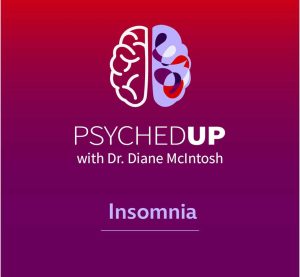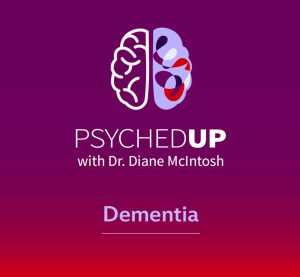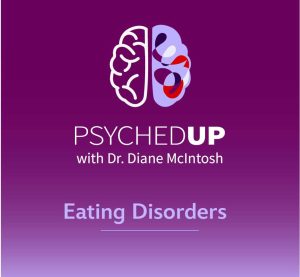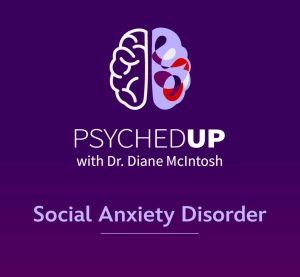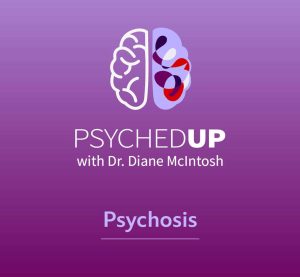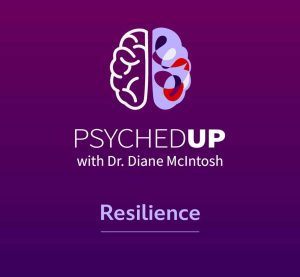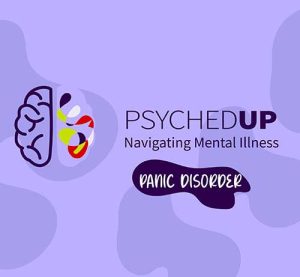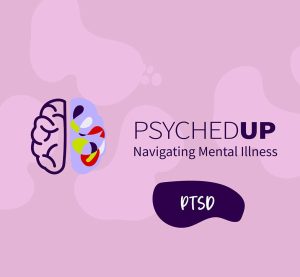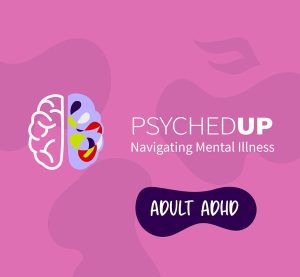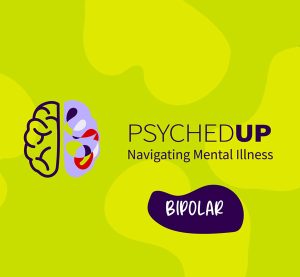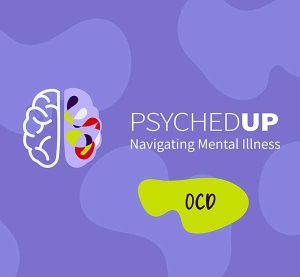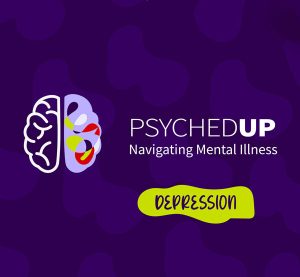
Episode 2: This is OCD
What is it really like to live with obsessive-compulsive disorder (OCD)? How do you recognize the signs, and what does effective treatment look like?
In this episode of PSYCHEDUP, Nadia shares her personal experience with OCD, offering a vivid glimpse into how even a simple trip to the park with her kids could spiral into an overwhelming storm of thoughts and emotions.
In this conversation, Dr. Diane McIntosh brings her signature blend of compassion and expertise to the discussion, breaking down the symptoms and diagnosis of OCD. Joined by her colleague and friend psychologist Dr. Randy Mackoff, she dives into the most effective treatment for this life-altering disorder.
Tune in for an insightful, empathetic look at OCD and how to start the path to reclaiming control.
Listen to This is OCD:
This is OCD Transcript:
00:00:01
Dr. Diane McIntosh: You’ve reached the private voicemail of Dr. Diane McIntosh, please leave a message.
00:00:06
Nadia: Hi, Dr. McIntosh, it’s Nadia. My OCD has been really bad. I keep having thoughts that something’s going to happen to my kids at the park and I’m having a really hard time taking them. So I have to check everything over and over and over again to feel safe and I need help because it’s taking over my life.
00:00:24
Dr. Diane McIntosh: Imagine having thoughts like these.
00:00:27
Clip: Did I leave the stove on? Did I leave the stove on?
00:00:28
Dr. Diane McIntosh: Constantly interfering in your life.
00:00:30
Clip: I should check the stove. What if I start a fire? I need to check the stove. Check the stove. What if the stove starts a fire? I should check the stove. Check the stove. Check the stove.
00:00:35
Dr. Diane McIntosh: It’s awful, but the thought just keeps coming over and over and over again.
00:00:40
Clip: Check the stove.
00:00:40
Dr. Diane McIntosh: You try to stop thinking about it, but it just keeps coming back, provoking a huge amount of anxiety and distress, and impacting your ability to function normally.
00:00:49
Clip: You left the stove on.
00:00:51
Dr. Diane McIntosh: This is what it’s like to have the obsessions associated with Obsessive-compulsive disorder. In this episode, we’re going to learn more about OCD, what it’s like to live with it, and how to treat it. I’m Dr. Diane McIntosh, and you’re listening to PSYCHEDUP.
So on this show, each episode will focus on one mental illness. Today it’s OCD, or Obsessive-compulsive disorder. We’re going to talk to someone who is living with the disorder to hear about their experiences. What’s it really like? We’ll cover everything from symptoms and diagnosis, through to treatment, whether it’s medication, talk therapy, complementary therapies, or a combination of all of those. As a psychiatrist, I want anyone experiencing any of these illnesses to be able to hear these stories and know there is a path ahead. My goal is to educate, destigmatize and inspire. Welcome to PSYCHEDUP.
So there are two parts to OCD. There are obsessions and compulsions. Most people have both, but you don’t need to have both to be diagnosed with OCD. I want to introduce you to someone who knows more about OCD than most people.
00:02:06
Nadia: Hi, I’m Nadia. I’m in healthcare. I have two small kids, I’m married.
00:02:12
Dr. Diane McIntosh: Nadia has OCD. For me, it is one of the most challenging disorders I treat. Obsessions are recurrent, intrusive, and persistent. They can be thoughts.
00:02:24
Clip: You left the stove on.
00:02:25
Dr. Diane McIntosh: Urges.
00:02:25
Clip: I should push her.
00:02:26
Dr. Diane McIntosh: Even images or impulses.
00:02:28
Clip: What if I start a fire?
00:02:29
Clip: I think I have cancer.
00:02:30
Dr. Diane McIntosh: And they’re always inappropriate and unwanted. I call them, sticky thoughts. You try to push them away but they stick to you, they keep coming back.
00:02:39
Clip: You left the stove on.
00:02:41
Dr. Diane McIntosh: So some of the typical obsessions I’ve heard are things like fear of illness or contamination, but also unwanted aggressive thoughts, like harming someone you love. There’s also taboo thoughts around religion or sexuality. Nadia remembers first noticing her symptoms when she was about 10 years old.
00:02:59
Nadia: I did have a preoccupation with religion when I was younger, doing bad things and the repercussions of that. As I got into my university days, it was centered around my grades and worrying about tests after or anything after I’d done them and obsessing about the grade and what could potentially happen there, and that sort of thing.
00:03:18
Dr. Diane McIntosh: The fear of causing irreparable harm is very common in OCD. For instance, having repeated intrusive thoughts that you could provoke a serious accident, or maybe even cause a wildfire that might destroy your town. A loving new mother with OCD might have an intrusive thought that she could put her baby in the microwave. That would be the last thing on earth she’d want to do or ever do, and of course, she’d never tell anyone because of the shame associated with even having the thought. And then of course, there’s the fear that if anyone knew she had that thought, they might take her child away.
00:03:53
Nadia: So I’ll give you an example of when I would think about taking my kids out. It would go something like, okay, I’m going to take them to the park. So, okay, we’re going to drive there, but what if this happens? Well, what if that happens? What if we get into a car accident? What if they end up dying? What if I have to take them to the hospital? What if the ambulance has to come? And that’s just getting in the car and driving to the park. And then once you’re at the park, you’re hovering over them and worrying, like, what if they fall? What am I going to do? Do I have my phone? Can I call 911? Is my phone charged? Do I have enough gas in the car? Do I know where my husband is in case something happens? Just things that are just so, I don’t want to say crazy, but things that are just so beyond what you would normally think of.
00:04:37
Dr. Diane McIntosh: And it’s not just at home, Nadia’s OCD also follows her to work.
00:04:42
Nadia: A lot of my symptoms also revolve around my job and the potential for causing harm to someone through my own errors. So that often means coming home from work and reliving the day over and over again.
00:04:56
Dr. Diane McIntosh: To be clear, Nadia is really good at her job. It’s just that her thoughts, her brain undermines her. Yes, she might make a mistake, we all might make a mistake, but with OCD, every workday is scary and much less productive if you can’t stop obsessing about a potential mistake.
As you can imagine, these obsessions are horribly distressing and not even remotely what someone would want to think or feel or do. They are an awful thought. They’re not a wish, not a hope, not a desire. So, what do people do? They try to ignore them, to suppress them, to neutralize the thoughts. They perform mental acts meant to help overcome the obsessions, and these are called compulsions. Compulsions are repetitive behaviors or mental acts that a person feels driven to perform, and they usually follow very rigid rules.
00:05:51
Nadia: Just like counting specific things or numbers that would have meaning that really shouldn’t have meaning.
00:05:57
Clip: Check the stove.
00:05:58
Dr. Diane McIntosh: The thoughts or acts must be done exactly the same way.
00:06:01
Clip: I’ll wash my hands again or I’ll get sick.
00:06:03
Dr. Diane McIntosh: Or they can be considered ineffective or incomplete.
00:06:06
Clip: Now I have to start over.
00:06:07
Dr. Diane McIntosh: Which heightens distress.
00:06:08
Clip: I think I have cancer.
00:06:09
Dr. Diane McIntosh: So then they repeat.
Compulsions can be really time-consuming and sometimes terribly onerous, but they’re also clearly seen as excessive or senseless to others, which is why OCD is really hard on relationships.
00:06:24
Nadia: I didn’t know what was wrong with me. I couldn’t relate to other people when other people couldn’t relate to me, and I felt really isolated and alone, but I didn’t know why or how that was. And so the relationships I had were often chaotic and they didn’t last for long times.
00:06:39
Dr. Diane McIntosh: Most people with OCD have insight, which means they know their behavior makes absolutely no sense. They certainly don’t choose to have a brain that makes them waste their valuable time checking the stove.
00:06:51
Clip: Check the stove, check the stove, check the stove.
00:06:53
Nadia: Your mind tries to fill in all the blanks with all these negative things, but you’ll never know what happened until the next day. So you’re basically spending a lot of time spinning in your thoughts and wasting time that you could be doing something else. And it’s a really negative and painful experience.
00:07:07
Dr. Diane McIntosh: Most of Nadia’s colleagues don’t know about her OCD. She’s worried about losing their trust.
00:07:13
Nadia: So you’re living kind of two different lives in a way, because there’s your life that you present to work and hopefully no one notices that you’re having all these weird thoughts. And then there’s your inner life, where things are just awful and chaotic and sad and frustrating, and, yeah.
00:07:35
Dr. Diane McIntosh: Other compulsive behaviors, such as excessive or dangerous drug or alcohol use, gambling or sexual addiction, also feel out of control. But the thing is, the compulsions associated with OCD are not inherently pleasurable. You don’t enjoy a high from a compulsive behavior. At best, you get a moment of relief.
00:07:53
Nadia: So constantly checking for a grade to come up in university, for example, or seeking reassurance from friends about constantly thinking I failed at things, and then having to check that over and over and over again. And no matter what answer you got, it was never satisfying. So even if someone said, “Oh, I’m sure you did great,” or, “You always do great,” or whatever, it would never stop.
00:08:15
Dr. Diane McIntosh: Up to 3% of the population suffers from OCD, affecting women and men equally. It’s found around the world irrespective of social status or cultural background, and it tends to start early in life, with about a quarter of people reporting their symptoms started as early as age 10, but most people say their symptoms started in their late teens or in their 20s.
When it comes to diagnosing OCD or any psychiatric disorder, we have no objective tests. We don’t have brain scans or blood tests that can help us to ensure if we have the right diagnosis and to guide our treatment choices, but we do have specialized questionnaires. They’re called clinical scales and they’ve been studied in large populations, so we do know they’re highly likely to pick up the diagnosis of OCD and to quantify its severity. Sometimes these are administered by a person who has the diagnosis, and sometimes they’re administered by the person who’s making the diagnosis, whether it’s your family doctor, a nurse practitioner, or psychiatrist.
A real challenge when diagnosing OCD is that patients rarely share every symptom. That’s because as you heard earlier, obsessive thoughts can be deeply embarrassing or really troubling. But knowing their full scope is really important to ensure every symptom is addressed.
00:09:30
Nadia: It’s really important for people with OCD to know that the sooner they get treated, the less intense it’s going to be and the easier it will be for them to get better. I have stressors in my life, my OCD gets worse, a lot worse. And what happens is when it gets bad and it’s bad for a while, then it’s really hard to come back from that. So if you start to notice any symptoms in yourself that you think, oh, maybe this is OCD, try and get help right away.
00:09:55
Dr. Diane McIntosh: You heard it from Nadia. A proper diagnosis and treatment is life-changing. So let’s get more into that.
I’m here with Dr. Randy Mackoff. Now, Randy is a psychologist, but he’s also an dear friend and a colleague, and he’s also here as a regular on this show because he’s a talk therapy or psychotherapy expert. Thank you for joining us, Randy.
00:10:21
Dr. Randy Mackoff: It’s great to see you, Diane. Thanks for having me here.
00:10:24
Dr. Diane McIntosh: So, today we’re going to talk about OCD, and from my perspective, Randy, this is the most difficult disorder that I treat. I find that it is usually very complicated from a medication perspective, and as a psychiatrist, that’s the angle that I’m generally taking. But I’m wondering from your perspective, doing talk therapy or psychotherapy, do you find the same? Is OCD particularly difficult or is it similar to other disorders you treat?
00:10:50
Dr. Randy Mackoff: Great question, Diane, because often what I find is that people have some degree of embarrassment talking about their OCD, and they’ll talk everything around it. And I’ve spent a year with a patient before I’ve even recognized that they have OCD because that’s not what they presented with. Once I’ve identified the person as having OCD, I say, “Hey, look, this has got to be a combined treatment. Medication is going to help and cognitive behavioral therapy is going to help.”
And from a psychologist perspective, it’s not about eradicating all the symptoms, because there has to be a degree of acceptance in our life for all of us for different things that we experience, but it’s about so that it doesn’t interfere in the really important areas of functioning in someone’s life.
00:11:30
Dr. Diane McIntosh: Absolutely, and the fact that every time you do a compulsive act, say you’re checking the stove over and over again, your brain is reinforcing the wiring that makes you check the stove.
00:11:42
Clip: Check the stove, check the stove, check the stove.
00:11:44
Dr. Diane McIntosh: And one of the big parts of cognitive behavioral therapy, CBT, is being exposed to the stove by the stove but not checking it. And every time you don’t yield to that compulsion to check the stove, you’re actually rewiring your brain not to have to check the stove.
00:12:00
Dr. Randy Mackoff: Exactly, and I think also it has to be sort of emphasized, is that it takes time and it’s not easy for people to be able to do.
00:12:08
Dr. Diane McIntosh: It’s hard work. It’s really, it’s hard work.
00:12:11
Dr. Randy Mackoff: It’s hard work, and having hard work and having difficulties with it and setbacks is nothing to be embarrassed by.
00:12:18
Dr. Diane McIntosh: Randy, a patient comes into your office for the first time, they’ve never had therapy before, but they have a diagnosis of OCD. What should they expect?
00:12:26
Dr. Randy Mackoff: In general, what we’re going to talk about is facing the fears and that if you run away from your fears, they become that much more frightening. So, what we’re going to do is we’re going to start off in a really safe environment where we’re going to have a hierarchy of what’s going on for you.
00:12:43
Dr. Diane McIntosh: By hierarchy, Randy, you mean, what are the scariest thoughts, down to the least scary thoughts? And then starting with the least scary and working your way along?
00:12:51
Dr. Randy Mackoff: Exactly, yeah, exactly. From there, learning some ways of not responding, ways of self-soothing, ways of calming oneself, dealing with distress regulation, emotional regulation. And these are great skills for all of us to have in a variety of different settings, but these are then tailored for the difficulties that the person’s experiencing as a result of the obsessions and then the ritualistic behaviors. Then we use some visualization, then we gently start to expose them to stimuli in the real environment, and then we examine what’s working, what’s not working.
00:13:28
Dr. Diane McIntosh: So by stimuli in the real environment, you mean things like situations at work or in their home life that can be provocative and talking about how to approach that?
00:13:38
Dr. Randy Mackoff: Exactly, that’s a great clarification. I appreciate that. Diane.
00:13:41
Dr. Diane McIntosh: You and your scientific mumbo-jumbo, Randy.
00:13:44
Dr. Randy Mackoff: Mumbo-jumbo it is. So Diane, what is going to be the medication approach, and what are some of the challenges? And also, how do you work with the patient who is a little bit fearful of medication when it comes to treatment?
00:14:01
Dr. Diane McIntosh: I think one of the most important things, Randy, is that we make this diagnosis as early as possible. And because so many people feel ashamed and uncomfortable, it’s hidden for a long time. And it’s not uncommon for me to see people who have had OCD for 40 years, and they’re really still struggling with all of the symptoms. So it’s important to get that diagnosis right as soon as possible after the symptoms start. Then we need to get to the right treatment, get that going, including medication and talk therapy. That’s what gets us on the right path. Protecting my patient’s functioning and reducing their suffering.
Unfortunately, OCD can be really difficult to treat because it tends to be chronic, so it’s always present to some degree, and often present for a really long time before treatment starts. That’s because it’s really hard to talk about. This is why I like to work closely with psychologists. I need a partner in the treatment of OCD. Another partner that is far too often overlooked is my patient’s support, whether it’s a close friend or a family member. One of the first questions I like to ask my patients is, “Who do you love? Can I meet that person, that person who’s your greatest supporter? It doesn’t need to be a family member, but someone who cares about you, someone you care about, and that will care about the process, so that we can add them into the discussion.”
00:15:23
Dr. Randy Mackoff: I love hearing that, Diane, because I’ll have patients come in who will say, “I’ve been started on a medication, but my partner or my friend has told me that I just need to do more yoga and that will control the OCD.” And I don’t say that facetiously, I think people are really, they have good intentions, but in that good intention, sometimes they’re creating some harm.
00:15:42
Dr. Diane McIntosh: You can’t yoga your way out of OCD. You can’t yoga your way out of a severe depression.
00:15:47
Dr. Randy Mackoff: No.
00:15:47
Dr. Diane McIntosh: That’s part of the stigma, medication bad, instead of, my job, which is to personalize the medication to meet each unique individual’s needs. And that’s the hardest thing to do because we have to do a lot of trial and error and find the one that has the least side effects, that works effectively, because no drug will work if it’s not taken.
And speaking of medications, the most common medications we use to treat OCD are antidepressants. I try to squeeze everything I can out of one medication before trying something else or adding another treatment. Often with OCD, higher doses are required. That’s for all disorders that have some degree of anxiety, and OCD is no different. It’s not uncommon for my patients who have OCD to require more than one medication to manage their symptoms. With each treatment working somewhat differently, that’s why we combine them so that they bring together synergistic effects. That may mean more than one antidepressant or the addition of a medication called an antipsychotic.
00:16:47
Dr. Randy Mackoff: And the interesting thing, Diane too, also that just popped out when you were talking is you said an antidepressant medication. Now, my experience has been, of course when people are experiencing OCD, sometimes they are depressed, but then sometimes people are really not depressed and then they’re seeing their physician psychiatrist and they’re being told they need an antidepressant and they go, “Hold, why do I need an antidepressant?” Can you help me understand that a little bit better?
00:17:10
Dr. Diane McIntosh: Thank you for asking that question, Randy, because we have used these old words for so long. We use the word antidepressant for drugs that we use for depression, for anxiety, other purposes like pain, for neuropathic pain. So these are treatments that have one name that are actually used for many disorders.
The other big one is antipsychotic treatments. They are important for psychotic disorders like schizophrenia, for instance, but many have indications for depression, are effective for anxiety disorders, and actually are quite commonly used in OCD. So, giving someone an antipsychotic, I have to do a lot of education around, be careful what you read, you do not have psychosis, you have OCD, and I’m using this because we know from the science that this is very effective. But we need to do a lot of education around using words like antidepressant and antipsychotic, because that is stigmatizing. And often, the information you get from the pharmacist or what you find online at Dr. Google, is really scary.
00:18:11
Dr. Randy Mackoff: It is scary, and sometimes they’re a little freaked out hearing that they’re on an antipsychotic because of what people are telling them and just the term of itself. And once they see the benefit of it-
00:18:21
Dr. Diane McIntosh: And fast.
00:18:22
Dr. Randy Mackoff: And really fast, yeah, it’s really a marvel and it’s really fantastic.
00:18:27
Dr. Diane McIntosh: You nailed it, my friend. We are 100% aligned, as usual. Thank you.
00:18:30
Dr. Randy Mackoff: Thank you.
00:18:34
Dr. Diane McIntosh: So I’m going to wrap things up, a shrink wrap, if you will, by digging into some science that explains why talk therapy is such an important treatment for OCD.
Now, I’m a big fan of the trades. We need more electricians and plumbers and carpenters, and Randy actually manages to bring together the best of both worlds, the trades and academia. I’ve never thought about it this way before, but a cognitive behavioral therapy expert like Randy, is actually a brain electrician.
Our brain is constantly wiring and rewiring in response to many factors, like learning new information or developing new skills. The brain’s ability to remodel or rewire itself is called neuroplasticity. Every time you go to that dance class and learn a few new steps, your brain is being wired to help you to learn and remember those steps. Pretty soon, you don’t even need to think about the steps, you do them automatically. An example of bad neuroplasticity is the repetitive behaviors associated with OCD. Let’s stick to that, checking the stove example.
00:19:39
Clip: You left the stove on.
00:19:41
Dr. Diane McIntosh: Someone struggling with a compulsion is unable to do it just once, feel reassured, and get on with their day. Instead, they might feel momentarily reassured when they act on that compulsion, but within minutes, the intrusive thought, the stove might be on-
00:19:57
Clip: You left the stove on. Check the stove.
00:19:58
Dr. Diane McIntosh: … creeps back into their head, compelling them to check again. Every time they do this, the wiring is further reinforced and strengthened. In fact, every time the person yields to the compulsion, the likelihood that they’ll have the thought and check the stove again, increases.
Exposure and response prevention, ERP, is the talk therapy for OCD that has the most scientific evidence. It works by replacing bad neuroplasticity. I think of an ERP therapist as being like a highly skilled electrician. They are experts in helping you to rewire your brain. They work with you to replace the bad neuroplasticity, the faulty wiring that leads to and reinforces compulsive behaviors, with new wiring that sets their patients free of those compulsions.
So, what’s it like for someone with OCD after they get effective treatment? Well, let’s just check back in with Nadia, to hear how her journey progressed.
00:20:56
Nadia: I had a really big struggle maintaining a regular life until I was about in my late 20s, when I was introduced to my current psychiatrist and she sort of figured out everything that was going on. So it was a long time of struggling, even though I was on medication and I had been on a million different medications and none of them helped, and it was a difficult way to live. But then once I figured out all the things that were wrong and was able to treat them appropriately, things got a lot better. And I had a really hard time believing that it would be able to change, but after I got on the right medication and I was getting the right pill, I was able to form a meaningful relationship, get married, have kids, all the things I never thought I would be able to do in my life.
00:21:42
Dr. Diane McIntosh: This doesn’t mean that Nadia is cured. She still has OCD, but her life is her own again.
00:21:48
Nadia: So, I was able to take both of my kids out at the same time to the mall, and that was amazing. It sounds so silly, but it was such a hurdle for me and when I did it, I was so terrified. And even after it was over, I was terrified but then I looked back on it and I was like, wow, I did it. I was actually able to do that and it was such a big accomplishment for me.
00:22:11
Dr. Diane McIntosh: And that’s the thing about OCD. You really have to celebrate the wins, because each one increases the chance of the next success. But another important part of living with OCD is self-awareness.
00:22:24
Nadia: So I take medication every day and then when my symptoms get worse, there is medication that I can take on an as-needed basis as well, but I don’t usually have to take that unless things get really bad. And then I see a psychologist just about once a week or once every couple of weeks for cognitive behavioral therapy, and that’s been really helpful. It is possible to get your symptoms under control and get better and have a normal life.
I would say in general, I’m doing pretty well. So there are still hard days and times when things are harder. Like I said, if I have other stressors, then my OCD does get worse, but I have the right people in place to help me kind of come back to normality, and I think things can only get better. I’m excited to see my kids grow up and be able to be there for them in a way that’s meaningful to myself and to them as well. And even though things are hard sometimes, they’re never as hard as they were before, so I always try to remember that. There is always help and there is always hope.
00:23:24
Dr. Diane McIntosh: Nadia, thank you so much for sharing your experiences with us, I am so grateful.
This is PSYCHEDUP, an original podcast from RAPIDS Health. If you know anyone who has OCD or love someone who does, please share this with them. And if you think you might have OCD, please reach out to your primary healthcare provider and ask for help. You contain the obsessive thoughts and the compulsive behaviors with the right resources. And if you liked what you heard, please follow and rate the show, it helps other people who might want and need some guidance to find it. Until next time, I’m Dr. Diane McIntosh.

